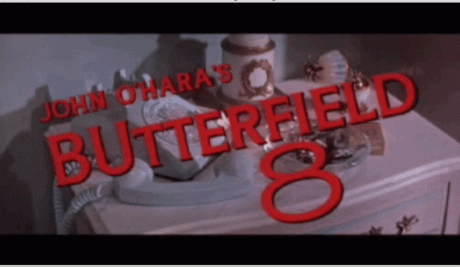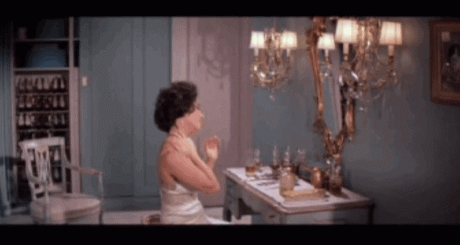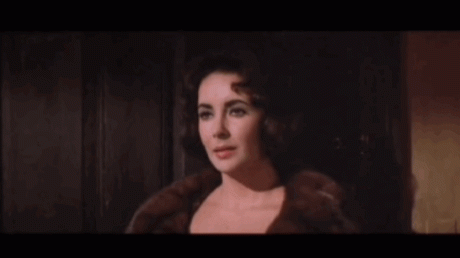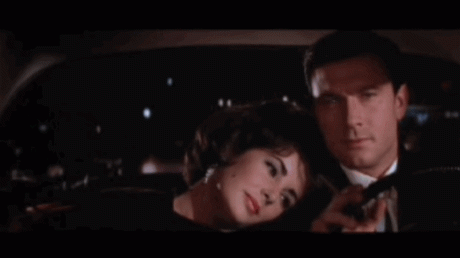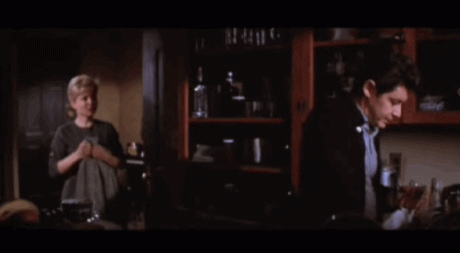


Gloria’s little red sports car pulls up in front of a row of lovely houses. She gets out, and Ligg tells her “That’s where I was born” There’s snow on the ground, and you can hear the wind howling around them. Ligg tells her his father “was an inventor…can you think of anything more useless in a small town like this?” she says “Not if he invented a way to get out”
“He was certain I’d go a long way in this world.” Gloria says”And you did, didn’t you?…the head of a big chemical company”
“I’m just another hired hand, the company belongs to my wife’s family…My wife is a fact that I can’t avoid…she’s the center of a huge spider web of family, money, country clubs, and childish time killing employments, all into at once” Gloria touches his lips with her leather gloved hand to hush the words that are aching him and they embrace in front of an elderly couple walking by looking shocked.


Gloria’s mother and Francis are sitting at the table drinking coffee and playing cards. Annie seems distracted. She mixes up her cards, “what did I play” Francis says “Your heart and I can hear yours pounding across the table”Annie apologizes and says she’ll pay better attention.
Fannie says “I’d rather you put your troubles out and put them on the table” “I don’t want to burden you with them” “So what am I your friend for…your money?…or maybe I wanna steal your husband” She continues “Look you think I don’t that you haven’t heard from your daughter in 6 days” Annie looks upset “she’s never done such a thing before without calling.”
Annie slaps the cards down on the table and gets up.”Something terrible must have happened” Fannie says “Now why does it have to be bad, there are good things that happen too ya know” “Francis look you’re my best friend but I can’t talk to you frankly” “Why not?” “There are things you don’t know about and shouldn’t…nobody should, “Francis says “Yes they should,” Annie tells her “No her father died when she was so little…I only wish she had a father who was wise enough and strong enough to keep her on the right path” (yet again an example of patriarchal rule giving governance) Annie looks out the window. “once there was a man I almost married…(she looks visibly shaken)


“The Major, Major Hartley” she starts to cry a little “Somehow or other Gloria didn’t like him” We see Annie’s profile, Francis listening “it might have been good if I had” Francis walks over and puts a comforting hand on her shoulder and in a stern voice says “Annie, Gloria’s a good girl, don’t worry about her”
Annie cries out “But you always say such impolite things to her” “I say the same thing to everybody, I’m a born critic…there’s bad in everything, but there’s good too…her good far outweighs the bad” Fannie is one person aside from Steve and Happy who sees the virtue and kindness in Gloria.
“Oh if she was as bad as she pretends, you wouldn’t have heard from her in 6 years.” Annie asks “Do you mind if I kiss you?”Fannie grabs her with a big wide hug “You do and I’ll spread a big ugly rumor all around the neighborhood.
Crossfade

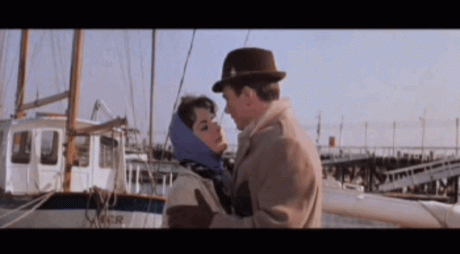
While Gloria and Ligg are walking together on a pier Liggett uncovers his old rust bucket of a Yacht, and the two go inside the cabin to spend some romantic time together.
Emily Liggett is sitting in bed reading. Her mother Mrs Jescott played by the gritty Carmen Mathews enters the room. “You should be in bed. And you shouldn’t be in bed, alone” She sits down and says that she wants to tell Emily about the family. “We’ve had sacrifice and cowardice, honor and infidelity, courage, love, deception, confusion, brilliance, tragedy”



Now seated across from her mother as an equal, Emily is more assertive “Mother if there’s anything wrong with Wes we brought it about” she explains “Instead of my living his life, we brought him here to ours, and we handed him a big gift wrapped package and said, here, here’s your life don’t bother to live it yourself…you even presented him with a meaningless job, all title and no work.”
“One day he woke up with energy to burn…and he started burning it, but in all the wrong directions…liquor, women, defiance and the more he did it the more he had to go on doing it to justify it.”
Emily’s mother says “But you’re not running a mission for lost egos” “Mother I’m running a marriage, not just through the good days but through the bad days too. Some day Wes is going to find himself.
(Gloria is also on a journey of self-discovery yet still considered a tramp while Wes doing all the same things is going to find himself),and when he does his wife will be there waiting for him. Gloria only awaits loneliness and a terrible end.
Back in NYC Gloria and Liggett are walking arm and arm down the busy city sidewalk. Gloria sees a leather attache case and stops in to buy it for Steve’s birthday.



Gloria calls over to “Liggett, I’m going to have to leave you today and go see Steve” he says “Now Look” she says “I know, you’re with me kid remember” Gloria asks the clerk if what she called in the other day was ready yet. The clerk goes and gets it. Gloria hands Liggett a small gift-wrapped package. It’s a sterling silver lighter with the inscription BU8 on it.
He smiles and kisses her. “Gloria there’s something I have to tell you” She looks deeply into his eyes, “you act like a man who’s expecting his wife back in town.” ” How did you know?” she says “I always knew…someday,” She says thank you for not calling me, honey and babe and doll face anymore,” he says “I couldn’t I don’t think of you like that anymore”
Crossfade



The little Yorkie sitting atop a pillow like a princess on Annie’s couch. She comes into the apartment and calls out “Mama.” Seconds later her mother walks in puts the packages down and runs over to hug her daughter. “Mama I want to tell you what I’ve been doing” nervously “No dear, you don’t have to” “I’ve been with a man a whole week. Her mother gets up shaking her head disturbed “No”, Gloria says “let me tell you the truth for once in my life” her mother pleads ” no please, please, please”crying and turning away, Gloria goes after to her.
“Mama, we both know what kind of a girl I’ve been, we both know it” Her mother screams and covers her ears, shaking,”no I don’t want to hear about it”Gloria tries to grab her mother’s hands away from her ears, so she has to listen. She shakes her “Mama you have to!… unless I can be honest with you about yesterday, how can you believe me today?” “believe what?!”
“I am different, Mama I am different, yesterday it was men, a whole world full of men,” her mother says”let me go you’re hurting me, you’re hurting me!” Gloria begs, shouting “Mama face it, I was the slut of all time!” Her mother slaps her in the face. There is a sudden silence. A moment’s pause in the midst of crisis. Gloria looked so much more authentic, “if only you’d done that before…long ago…every time I came home all soaked through with gin.” Annie is sobbing, turns, and faces the wall “I’m sorry” she weakly speaks out.
Gloria touches her “It’s not your fault Mama, it never has been, it was in me…but it isn’t there anymore. It’s no longer just men for me, there’s only one man, one, just one…maybe it’s too late for marriage, but it’s not too late for love…now by some miracle, I’m like everybody else.” Annie is facing her daughter now. “I’m in love…you can look at me mama, without wishing I’d never been born” they hug.

Mildred Dunnock is remarkable as Gloria’s fragile yet caring mother
Fade to black
Gloria shows up at her psychiatrist’s office. Dr. Treadman says”Don’t try to analyze me, you don’t have the training” She comes back cleverly “Not in books perhaps”
“Dr Treadman are you hard of hearing?… I’ve been trying to tell you something…I don’t need you anymore!” he looks skeptical” I have no problems anymore…I’m in love, I am in love…I am really in love” He says that he’s delighted to hear it. Gloria gets up, shakes his hand, and thanks him for everything.



He calls to her “Gloria, Gloria while it is possible that sometimes love can solve many things, love is not so simple that you can rely on it as a complete solution, so if it isn’t all that you hoped it would be…if it doesn’t work out, don’t hesitate to come back…quickly.”
She looks back at him confidently “But it will work out, I’m gonna make it work” he calls over to her again as she is walking out of his office. ” but if it doesn’t”” but it will, it has to”
Crossfade


Gloria knocks on Steve’s door, he opens the door she kisses his cheek wishing him a happy birthday, holding flowers and his present. Norma’s on the phone. Gloria is snuggling all over him, kisses him trying to get him in trouble while Norma’s on the phone.
“what are you trying to do to me?” he says laughing, she says “oh you drive me wild with desire,” he asks “Gloria where’ve you been all this time?”I’ve been chained to the wall of a sanitarium trying to keep away from you”Steve has to leave to meet up with Norma.
Gloria follows him over to the closet. And sees the fur coat. Liggett’s wife is coming back to town today, “The coat, oh the coat, what am I going to do?” She runs out of Steve’s with the fur.
Short scene.



Just as Gloria is walking towards the doorman to Liggett’s apartment building with his wife’s fur, Emily Liggett gets out of a limo wearing another fur coat. The doorman greets Mrs. Liggett, and Gloria is stopped in her tracks. She runs back to her little red sports car with the coat, gets in, and starts crying.
Crossfade
Emily is sitting at her dressing table doing her nails. Wes gives her a kiss and welcomes her home. She thanks him and acts surprised at the gesture. She tells him that “there’s a certain aliveness about you” She tells him her mink is missing. He says maybe she left it out on Long Island. But she’s checked it’s not there.


He tells her he’s been home the whole time and nobody else has been there. Then he looks down at the cigarette lighter. He leaves the room, and she runs after him calling Wes. She wants to call the police, but he grabs the phone from her. “the cheap publicity and all” they argue for a bit. “let me do it my way shall we, without your mother!”
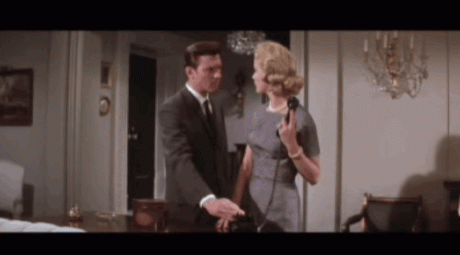
Liggett is at a bar, asking if the bartender knows Gloria. “you don’t have to describe her to me Mr. Liggett, I’d know her with my eyes closed, on the bottom of a coal mine, during the eclipse of the sun” She hasn’t been in for over a week.”Without her this place is dead, she’s like cat nip to every cat in town”

He goes to the next bar. two men approach him and ask where he’s been. Then they say Gloria’s the kind of business they wouldn’t mind having again. One man puts his arm around Liggett, “Oh come on Liggett come on Gloria, ha sure, she’s she’s frantic isn’t she like a rocket right off the earth…mother I’d have left home for that…she’s got a traveling hitch, she’s like a flea hop hop hop from one dog to another, bites ya and she’s gone, she picks ya up and she drops you” Ligg looks worried, angry, the man raises a glass and says “well welcome to the fraternity we meet once a year at Yankee Stadium”
Ligg walks out and is on the phone now. “Now listen Butterfield 8 I’ve called her hundreds of times, (desperate) I’m her closest friend, you’ve got to tell me where she is, it’s a matter of life and death.(frustrated about to blow) you’re liars all of you liars fiends and liars now tell me!” he slams the phone down.

We see Gloria driving the red sports car and being pulled over by flashing police lights. Tells her to take it easy, don’t drive away her troubles. Tomorrow the sun will come up again just like it did today. She’s at Happy’s now. Happy brings her a plate of cookies. She’s telling Gloria a story about an actress trying to get a part in the show.


Trying to get in solid with the director.”Two days later or should I say two nights later, she was in, but solid, yeah with the director with his cousin, She was so busy getting in solid with every Tom, Dick and Harry and his uncle George that she wouldn’t recognize a producer if she found one right under her pillow…So time passes and our heroine is very big, yeah but not in the theater oh no, in all the wrong places…in 500 little black books…and 28 divorce cases, 2 police blotters, and in one restraining sheet in the psychopathic ward in Bellevue. Yeah, she hit it big, from a size 12 dress to a size 44. She went from looking like an Orchid to a face like a pan of worms and all because she said with only a rag a bone a hank of hair. I will move the world my way”
Happy sees that Gloria is sullen. She grabs her arm and tells her “Hey you live it, you kick up your heels, you grab everything you can get, you light the candle from one end to the other as they say…and then one day, you too can be the proud proprietor of a very heavily mortgage rolled side brick brothel, you’ll wish you were dead.” Happy eats a cookie looking down and disgusted with her life.
crossfade


Liggett is with his wife Emily sitting at the breakfast table. He gets up and pours vodka into his orange juice glass, “Don’t worry Emily it’s not alcoholism it’s just a kind of medicine”
He says he can’t he has to go out and look for her fur coat. She wonders why he feels so personally responsible for it. “Wes is there anything I can do?” he says ” When I come back with that coat which I will, I want you to throw me out” he takes his drink, and the scene ends.


Gloria’s mother is needle-pointing “Sorry I didn’t come home last night I spent the night in a motel, Annie looks worried but Gloria laughs “Alone” I had some thinking to do, then she passes a mirror and takes a hard look at her reflection. I saw a woman, utterly proper, utterly conventional, utterly beautiful.

Then she stares at herself in the mirror again. Annie says “You’re beautiful too dear,” She says “I have a face, and that’s not the kind of beauty I mean,” Her mother asks “What kind of beauty?” “The kind that comes from self-respect I guess, it shines” Her mother answers “I’ve seen that kind…it takes a lifetime to find,” Gloria says “I”m going to find it”Mom says “I think you will”
“Butterfield 8 called. Mr Liggett says he has to see you, it’s a matter of life and death.” Now Liggett’s sitting at a bar table, he’s already drunk. Gloria walks in holding his wife’s coat. He sees her and takes a long look. She looks back at him. He sees the coat. “so you did take it!”

“Yes and I’m sorry Liggett, may I sit down?” he says “That’s up to you Honey” The waiter comes by asking if she’d like to order, but Ligg says “No the lady’s not going to order” Gloria gives him the coat. “why did you bother to bring it back?” “because it isn’t mine” he throws it down and erupts quietly,” because you’re scared you mean…cause you to know I’m not like one of those ordinary Joe’s you take for a sleigh ride…because you know while I’m might have given you the world, I’d tear your head off if you’ve stolen as much as a nickel from me, isn’t that it?” she quietly shakes her head and says “no.”

He drunkenly says “So you pick up the man when you want, and drop him like a bomb,” he drops his glass. it breaks, “When you want…people don’t mean anything to you, do they?, the way they feel in here ( he points to his heart) not down where you live” she cries “I care about some people,” he says “for an hour, or a day, or a week, til you’ve had your kicks, then you slither off to the next one.”

She is so visibly struck silent “I’ll talk to you tomorrow” he grabs her arm very violently, “there isn’t going to be any tomorrow… and for once somebody’s going to drop you, and go ahead try that heel trick again the one you use that gets the boys hot…I ought to break this arm right out of your shoulder” she says “May I say something to you” “Sure honey, babe, doll face, kid…say something sexy, something that always got the boys straight for the hotel” He’s still gripping her wrist, imploding.
Gloria reasons”You can’t have everything in life, be grateful for the few things you do get, no matter where they come from.” she’s holding it together, and he lets go of her arm “The pornographic philosopher….now you just sit there like a good tramp should until I get out of your sight…I can’t stomach being seen in public with you”

He’s creating a scene in the bar. Gloria picks up the coat and says “Liggett” he snaps “Don’t you dare mention my name in public again…( he gets closer up to her face and yells ) You’re a joke, a dirty joke from one end of this town to the other”
A man comes over to try and quiet Liggett, Liggett gets violent and the man punches him til he staggers off. Gloria runs after him with the fur.
They’re sitting in her little red car now. She tries to help him out of the car, but he shoves her away. Emily looks out the window at just the right moment and sees him getting out of Gloria’s car. Gloria gets out of the car and hands him the fur. He says, “For something like this you want me to give this back to my wife after something like you has touched it”!





He throws it back at her. Emily tears up at the window. He walks into the building and tells Emily to leave him alone. “Do you want a doctor?” Wes says “Yes and tell him to bring me something to make me unconscious before I can think.”

Gloria shows up at Steve’s. They’re in total darkness at first. Then Steve thrusts the room into the light. She’s wearing the fur “Ask me about the coat, Steve, ask me.”


“I see you still have it” “Because it’s mine..every skin…every thread…every hair…is mine….(she gasps for air) and you know why?… because I earned it, pretty good pay for one week…a thousand dollars in fur a day” She yanks it off her body.

Steve says “I take it Liggett couldn’t make it?” She says that’s not the important thing, the important thing is “I took money…you know what that makes me” She breaks down and sobs and hugs Steve. She says “Let me cry , let me cry like all the times I should have and never could”
She throws herself face down sobbing on Steve’s bed. He pats her back and she says Steve I have to tell you something” he says I know about you Gloria,” she says “You don’t know this…nobody knows this, except a certain man somewhere who I’d like to think of as standing in the middle of a lake filled with burning gasoline…she pauses and cries please listen…”
“I was 13, my father was dead, all older men seemed like fathers to me, but I wanted one of my own…to sit in his lap…and to hug him…and have him say I was beautiful.” She turns to Steve and asks “Do you remember Major Hartley? Steve remembers. “Major Hartley my mother’s friend, came down to Grand Central Station one day to pick me up from summer camp, Mother was away visiting. He took me home…he let me sit on his lap. he let me hug him…he told me I was beautiful.”

“He stayed in that house for one week, and taught me more about evil than any 13-year-old girl in the world knew” Steve quietly says don’t don’t. She turns to him viciously asserting “You haven’t heard the worst of it yet” She says with a smile and a defiant yet self-deprecating tone, “I loved it!!!!!…every awful moment of it, I loved…” screeching out the words”that’s your Gloria Steve, that’s your darling Gloria…I made a way of life out of it, the deep shame of it didn’t hit me til it was too late. I couldn’t go back to 13 again.”
She looks up a bare trace of light on her face, “I had one chance to stop it, one last chance, and I threw it all away for 32 animals sewn together in a coat.” She’s crying into her hands. Steve goes to her, “It’s not all over…you have another chance. She says it doesn’t matter where she goes. But Steve tells her it matters a great deal what she does. “You got to decide what you’re going to do next, I do too, stay here tonight” She sadly kisses his cheek “Thank you Steve”

Crossfade
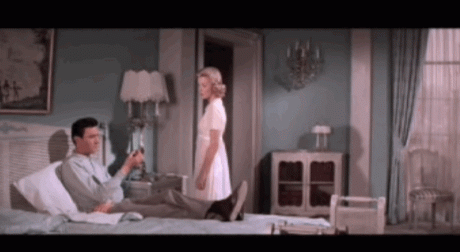
Liggett’s in bed smoking, and Emily asks “Anything you need Wes” He says “A divorce” he’s a failure as a husband and a failure as a man. She doesn’t want the divorce “Wes I love you.”
“I know you do and that makes the divorce all the more necessary…because I can’t go on disappointing you.” She asks “Do you love her, that woman you were with?” “I seem to” “but you fought with her and sent her away in a rage” “Yes I did, I was sick because I was afraid I was going to lose her…and I hated her unreasonably because I couldn’t stand the thought of losing her…just as you hate me now. Emily runs out of the room crying.

Gloria is back with her mother holding the dog, “I just called Butterfield 8 and told them to shut off the service and to send me a bill as soon as I have an address in Boston will you forward it to me?”

Fannie is there Gloria’s mother says “Yes dear I will” “take care of Mama Mrs. Thurber “Oh I got plans for her, my cousin Harry” “Oh Francis” “I’m a born matchmaker” Gloria pipes in ” at 10 percent of course,” Fannie say “naturally…look I don’t want to be a nosy neighbor but why Boston?” “Well that’s where the pilgrims made a fresh start, if it’s good enough for them I guess I can take it”Fannie replies “Can Boston take you?”


Mother asks ‘what will you do in Boston dear?” “Well, I’ll buy a paper, look up the want ads, same as any girl without a job,” Fannie says wearing Emily’s fur coat, “look before we start crying let’s get the luggage into the car…looking in the mirror, ah this is as close as I’ll ever get to heaven,” Gloria asks “Do you like it Mrs Thurber?” “Course not I’m only faint from not eating in three days” “It’s yours”
Fannie looks shocked”no” Annie is smiling, and Gloria says “Wear it in good health” “Oh no you can’t bribe me with this…I could never say a mean word about you as long as I live, I’d die of boredom ” “Well then just keep it warm for me” She turns to her mother “Goodbye mama” They hug very preciously and Annie says “I don’t want you to go, I have a feeling you’ll never come back” “I never will come back Mama, but I’ll send for you as soon as I can” she kisses her on the cheek, then kisses the little dog on the head.
Now Liggett is on the phone, “Did she leave any forwarding address?… Now look this is the most important telephone call of my life…you must tell me, please…Boston? You’re certain…thank you Butterfield 8, thanks”


Joe’s Barber Shop, a Gulf gas station, cars speeding fast on the road, he’s driving to find her. He stops the car, he sees the little red sports car outside a brick diner. She’s sitting at a table. She looks stunned. He says “Don’t be frightened Gloria, please…I can only think of one apology…will you marry me?… I’ve arranged for a divorce, wait for me, and in time, I’ll make you forget every word I uttered last night” “You can’t….I’m left with those words…I’m branded with them, but thank you for asking me to marry you…if only you’d done it yesterday it might have meant something, but not today.

“I only did what I did last night because you were so much in my blood that I exploded” “But you were right last night, no man could marry me and not keep remembering, you, you’d have to explode at my life..past and present, you couldn’t help but explode” Oh Gloria I can think of a dozen apologies” Oh I know, and I accept, but then look at all the thousand of explosions ahead and the thousand apologies and a thousand acceptances until we” he grabs her hand and kisses it, crying holding in his mouth. “til we both get so disgusted” he whispers “I love you I love you” And I love you…it’s no use it’s no damn use”
He wants to go over to Happy’s to be alone and talk ” If I get in a room with you, together, alone, I know what’ll happen, it’ll be the same thing all over again” Look Gloria, we started this whole thing together, we’re obligated to solve it together, please” She tilts her head she’s weakening.
Happy greets Liggett and says “Oh you brought another weary traveler. Hi Honey, welcome home”. Happy keeps talking, and Liggett gets impatient. ”Happy give me the key” Gloria is gripping the steering wheel of the car, hesitating to go into the motel room. Suddenly Gloria speeds away, and Liggett goes after her.







 ]
]




She’s racing the engine as fast as it will go. She gets onto the thruway, he’s in pursuit. She goes faster, looks behind her to see him following, and realizes too late that she’s hit a detour. Gloria skids off the road, and we see and hear a scream in the little red car as it goes off the cliff and smashes down into rocks. The horn stuck blaring. Liggett looks over at the wreck then the police show up, they are putting a stretcher in the back of an ambulance. Liggett is just standing there. A cop comes over “You saw the accident?” “Yes” Your name please” “Weston Liggett 10 -38 10th Avenue NYC.


The cop says “I stopped that same girl 2 nights ago for speeding, I wish I had put her in jail” Then another cop comes over “I haven’t made her name yet chief” “Her name is Gloria Wandrous” “You knew her?” the cops look at each other baffled.
crossfade


Liggett returns home, “You’re going to read about it in the newspapers tomorrow Emily, the family name your picture, my picture, everything, I’m sorry”
“Wes I don’t understand what’s happened tell me” “She’s dead…she lived for an hour unconscious but she’s dead,” Emily asks “who that girl?” “Yes, terrible, automobile accident, she was trying to get away from me, I’m sorry, so sorry”
He says solemnly “I don’t suppose that anybody would think that she was a good person but strangely enough she was. On the surface, she was all sex and devil may care yet everything in her was struggling toward respectability , and she never gave up trying”.
He jerks forward in a gust of anguish then turns to Emily, “I’m going out looking for my pride, alone, when I find it, if you’re here, I’ll come back and we’ll see if it still has any value to either of us” he walks out the door. The strings start dramatically, we are left with Emily standing in the apartment for a second before the screen goes black.
The End
Elizabeth Taylor rightfully won an Academy Award for this role. A woman cannot afford to be an individual who is sexually adventurous otherwise she is labeled a whore. Thus she is reviled by the very men who are themselves sexually active and ultimately she must be deconstructed and destroyed.
Gloria is also under a doctor’s care for this. Another factor in a woman having a strong sexual identity is that it is associated with a mentally ill pathology. Francis Farmer was lobotomized for this. Not many decades ago women were thrown into jail or Psych wards for this.
While men are heralded as being part of a Fraternity, a brotherhood of users, exploiters, and objectifiers. They are viewed as heroic and successful. They affirm their masculinity. While women, lose their self-worth and become dehumanized and shunned.
Gloria’s downward spiral was inevitable because she needed the outside agency of other sympathetic characters to find the good that is buried deep within her, when in fact it was obvious that she was a good person.
She is already a very dynamic, delightful, loving, and free-spirited individual, something to be honored and not reviled.
As in The Naked Kiss (1964), we see a double standard of male /female expectations.
Sam Fuller’s The Naked Kiss (1965): Part I: “There’ll be no later, this town is clean”
A woman’s sexuality is something to be feared, and judged, and also used as a weapon as it applies to the undoing of male power over logic. The theme of Madonna vs Whore syndrome, where she can’t be both, not able to exist in this world with this dual role she must be destroyed in order to be set free from the stain of her sexual nature. Kelly had to leave Grantville, and Gloria had to die horribly in a car crash, in order to destroy the sexual desire she both embodied and projected.
From “The Dread of Difference: Gender and the Horror Film” edited by Barry Keith Grant
Page 35 “Horror and the Monstrous -Feminine An Imaginary Abjection” by Barbara Creed
“All human societies have a conception of the monstrous-feminine, of what it is about a woman that is shocking, terrifying, horrific, abject. Classical mythology also was populated with gendered monsters, many of which were female. The Medusa with her “evil eyes” head of writhing serpents” -Barbara Creed
page 36 “It is not by accident that Freud linked the sight of Medusa’s to the equally horrifying sight of the mother’s genitals, for the concept of the monstrous- feminine, as constructed within and by a patriarchal and phallocentric ideology, is related intimately to the problem of sexual difference and castration.” In 1922 Freud argued that “Medusa’s head takes the place of the female’s genitals. If we accept Freud’s interpretation we can see that the Perseus myth is mediated by a narrative about the difference of female sexuality as a difference which is grounded in monstrousness and which invokes castration anxiety in the male spectator.” -Barbara Creed
Remember when Liggett tells Gloria that she should go slither away, making a reference to her as a serpent? Liggett is also emotionally castrated by his relationship with his wife and mother-in-law.




































































































































 ]
]








